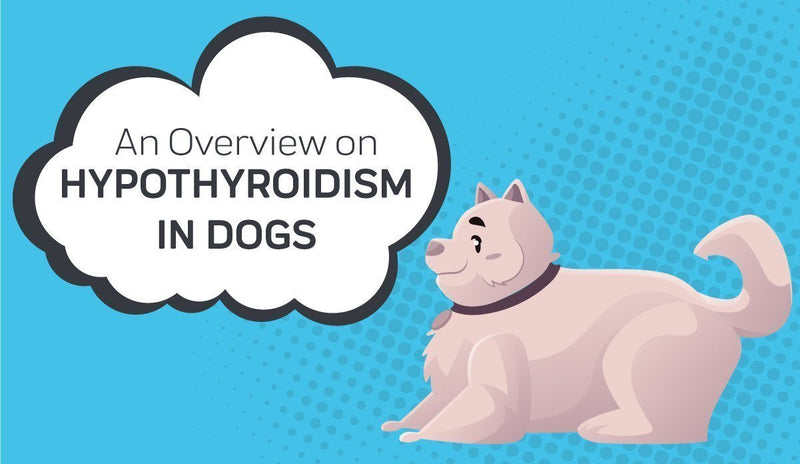As pet owners, we're sure you can agree that a sick puppy is a heartbreaking experience for everyone involved. Dogs are precious companions and the thought of them enduring any sort of pain is absolutely crushing.
TABLE OF CONTENTS

1. What Are Kidneys and What is Their Purpose?
2. Kidney Functioning in Dogs
3. Kidney Disease: What is it?
4. What is the Cause Behind Kidney Disease?
5. What is the Difference Between Kidney Failure and Kidney Disease?
6. The Two Types of Kidney Disease for Dogs
7. Medication for Kidney Disease in Dogs: Prescriptions vs Alternative Methods
8. Where Can You Buy CBD Oil for Dogs with Kidney Disease?
Unfortunately, dogs do get sick sometimes, but we encourage you to focus on positivity and channel your energy into thinking about the best possible outcome.
Dogs fall ill every now and again, but the diseases that are most concerning are the ones that become life-long situations. One of the most common types of illnesses that dogs face is called kidney disease.
While there are a few various predispositions to kidney disease, it can really affect just about any dog at any age. However, as with all ailments, the best form of action is one in which proactivity is involved.
The sooner you act, the sooner professionals can intervene and give advice on the best treatment options for your pupper's kidney disease.
We plan to talk to you in-depth about kidneys and their functioning within your dog’s body. From there, we will discuss the implications of kidneys that become infected, as well as how kidney disease affects other internal organs in canines.
We’ll walk you through a few possible examples of why and how your doggo contracted kidney disease. Then, we will inform you of the possible treatment options that are available to dogs with kidney disease.
Whether you take a traditional medical approach to your dog’s kidney disease or you opt into a more holistic way of treating the symptoms, there is still hope. Your dog is not alone in this process, and neither are you!
What Are Kidneys and What is Their Purpose?
The kidneys are internal organs that play a role in numerous bodily functions. While dogs normally have two kidneys from birth, they technically only require one. However, whether your dog has a set of kidneys or just one, they can still be prone to developing kidney disease.
On average, roughly 10% of dogs will develop kidney disease at some point in their lifetimes. This unfortunate illness can turn into something very chronic and fatal, especially when other variables are introduced to the equation.
The fact that kidney disease can become deadly is a sign that dogs do need their kidneys in order to survive. Humans do, too. It's the way of the world.
So if your dog comes down with kidney disease, it can seem very scary, but when you start to understand everything there is to know about kidney disease, the knowledge you gain will comfort you because you know what's going on.
But what are the kidneys and how do they improve the overall functioning of your dog's body? Let's talk more about that!
At their core, the kidneys are identical organs situated at about waist-level. Kidneys are positioned in the abdominal region of your dog’s body, between the spinal cord and the front part of your pup’s tummy.
There is one kidney on either side of your dog’s body, referred to as the right kidney and the left kidney. Though you might not necessarily think about kidneys in this manner, kidneys are part of your dog’s urinary system.
In cooperation with the bladder, renal pelvis, ureter, and urethra, the kidneys are one of five organs involved in the process of urination. When dogs have kidney disease, the simple act of urinating can be incredibly painful, among many other symptoms that we’ll divulge a bit later in this article.
Kidneys are like a collection bin, in a way. All of the toxins and unnecessary liquids in your body make their way into the kidneys.
The contents of the kidneys are transported to the ureters which take these unwanted fluids and pass them along to the bladder. The two-part system of the kidneys involves little cells referred to as nephrons. These are made up of tubules and glomeruli.
When liquids arrive at a kidney, the kidney's glomerulus acts as a filter system. It processes the liquids and decides what is and is not necessary for the body to hold onto, at which point the tubule intervenes.
Tubules are responsible for taking the liquids the glomerulus decides you need and gives them back to your body.
Whatever has been collected by the kidneys and deemed as being unnecessary by the glomeruli ultimately leaves the body by way of the urethra and in the form of urine. When kidney disease strikes, it makes this process so much more difficult and less smooth, causing complications along the way.
Let’s dive into the functions of the kidney as well as the side effects of kidneys that are plagued by disease.
Kidney Functioning in Dogs
The kidneys of dogs are primarily responsible for determining what stays and what needs to go in terms of the contents in your dog’s body. But they also engage with other bodily functions and play a part in numerous different processes.
Here is a list of the many various roles the kidneys take on for your doggy’s inner workings to carry on as they should:
- Balancing the levels of water in the body
- Analyzing chemicals in the body and decide which ones are not needed
- Regulating metabolism, to an extent
- Helping to control stomach acid and keeping it balanced
- Keeping blood pressure in check
- Creating and sending proteins throughout the body to control sodium levels in the body
- Filtering blood
- Holding onto water when the body is dehydrated instead of passing it on to the ureters
- Altering pH levels when they are not balanced
- Producing Vitamin D so that the bones stay healthy and strong
- Ridding the body of unnecessary waste and toxins
- Producing red blood cells so that the cell count is appropriate for your dog's needs
Kidney Disease: What is it?
Kidney disease is a condition that refers to any sort of damage that the kidneys experience. Initially, kidney disease presents itself in many different ways. The signs of organ failure will appear very abnormal for your dog and they will probably be very different from your dog’s usual ways of behaving.
The symptoms of kidney disease are…
- Less frequent urination or lower rates of bathroom use
- Exhaustion or constant fatigue
- Strained chest bones
- An odd pain that presses against the chest bones
- Seizures without any other explanations
- Random dizzy spells or incidents where your dog faints
- Difficulty taking in full breaths
- Nausea and vomiting that doesn't seem to go away
- Bloating as a result of excessive water retention
- Lack of responses to hearing his or her name
- Limbs that appear to be swollen
- Uncomfortable when you try petting him or her
If the signs and symptoms of kidney disease are spotted soon after they begin to present themselves, then dogs have a much higher chance of recovering and regaining the total health of their kidneys in due time. However, when the symptoms of kidney disease are left untreated, they can become exacerbated and ultimately reach the point of no return.
This is definitely the most unwanted outcome of all possible endings, so it is beyond important that you always keep a close eye on your dog's health. The sooner you seek medical attention for anything you deem suspicious about your dog's behavior, the sooner your dog can receive whatever it is that they need to become healthy once again.
There are two types of kidney disease in dogs. There is acute which means that it came on suddenly from something like a toxin exposure. There is also chronic kidney disease which is one that has gradually occurred. We usually see chronic kidney disease in older dogs. The acute is usually harder to treat as sometimes we do not know what is causing the problem before it is too late. CKD can not necessarily be cured but there are things that we can do to prolong the dog's life.
What is the Cause Behind Kidney Disease?
There is not just one sole cause of kidney failure for dogs. Many different aspects of your dog’s overall health can contribute to diseases of the renal organs in your pup’s body.
Here are a few of the contributing factors behind organ failure in dogs…
- Older ages
- Genetic predisposition as a result of your dog's breed
- The diet that your dog is living off of
- High-stress levels or uncomfortable home environments
- Unhealthy levels of blood pressure
- Sudden loss of blood or clotting of the blood
- Heart failure, or early signs of an upcoming heart attack
- Infections that have gone on without treatment
- Medication that has kidney failure as a potential side effect
- Dental diseases, including gingivitis
- Cancerous cells in the body, whether benign or malignant
- Genetic conditions beyond breed type that predispose dogs to kidney failure
- Kidney stones that are not passed by the body as they should
- Too many or too few proteins circulating in the body
- Trauma that shocks the dog's body into confusion
What is the Difference Between Kidney Failure and Kidney Disease?
Something very important to mention is that kidney failure is not the same as kidney disease. One major distinguishing factor between kidney failure and kidney disease is that kidney failure is not curable. Basically, kidney failure is the very beginning of kidney disease, and if kidney disease goes without treatment, then it transforms into kidney failure.
At that point, dogs -- and humans alike -- require a kidney transplant to replace the failing kidney. Hopefully, in the better of the two possible scenarios, your dog will not contract kidney disease in both kidneys.
Otherwise, both kidneys will need to be taken out of your pupper's body and replaced with healthy donor kidneys. Transplant procedures can be extremely detrimental to your dog’s body and the healing process is very taxing.
This is not to say that transplants are impossible by any means, but the point is that it’s much wiser to catch kidney disease before it transforms into kidney failure than to let symptoms persist without professional care.
Another name for kidney disease is a renal disease, which makes sense because anything relating to the kidneys is considered renal. There are ways to look out for potential signs of kidney disease or renal failure.
By taking your dog to the veterinarian for routine check-ups and always looking into any behavior that seems really weird, you can be sure to catch anything suspicious regarding your fluffy friend's well being.
Kidney disease and renal failure are incredibly scary illnesses that dogs can develop over time, but your dog is not doomed! Veterinarians are trained in preventative measures as well as what to do when dogs are diagnosed with these health concerns.
If your doggy has concerning kidney issues, take a deep breath and reach out to your dog’s trusted vet. Let them help you help your pup!
The Two Types of Kidney Disease for Dogs
Kidney disease has appeared in two unique yet somewhat similar ways. The two types of dog kidney disease are acute kidney disease and chronic kidney disease. Acute kidney disease, or AKD for short, is the baseline type of kidney disease that dogs who have renal problems are likely to face.
Abbreviated as CKD, chronic kidney disease is the other type of renal disease seen in dogs. As the name suggests, chronic kidney disease is far worse and more serious than acute kidney disease.
Acute kidney disease is still serious, despite being less concerning in comparison to chronic kidney disease. Acute kidney disease manifests in the way of numerous symptoms. From a lack of appetite and odd bathroom routines to weak muscles and insomnia, dogs do not respond well to kidney disease.
Other symptoms of acute kidney disease include...

- Poor dog dental hygiene
- Dry fur and unsmooth coats
- Sensitivity in numerous places, including the gums and the mouth
- Diarrhea or constipation, depending on the doggo
- Slow motions and lower concentration levels
- Overconsumption of water
- Restriction of water to leave the kidneys and exit the body
- A body backed up by toxins
- Tiredness and exhaustion
So, as you have probably noticed already, acute kidney disease symptoms are very similar to the generic symptoms of renal disease that we listed previously. However, just because these signs of kidney disease are not frightening doesn’t mean you should take them lightly.
If you do not act immediately on the signs and symptoms your dog is exhibiting, then you might be putting your dog’s livelihood at risk. Veterinarians can only help when you take your dog into the office to see them, so be sure to practice proactivity -- especially if you are concerned that your pup is possibly suffering from renal disease.
Chronic kidney disease manifests in the same ways as acute kidney disease, though a few other behaviors are indicative that the disease has upgraded itself to the chronic level.
These symptoms include…
- An inability to control the bladder leading to unintentional urination
- Ulcers in the mouth or sores on the body
- A very striking and unpleasant odor from within your dog’s mouth
- Extreme weight loss resulting from little to no appetite
- Lack of color in your dog’s face as well as faded emotional responses
- Dehydration without being coupled with higher levels of thirst
Medication for Kidney Disease in Dogs: Prescriptions vs Alternative Methods
There are many medications used for the treatment of kidney disease in dogs. From antibiotics like Amoxicillin and diuretics such as Chlorothiazide, kidney disease in dogs can also be treated with antifungals and ACE inhibitors. The one downside to prescription medications for dog kidney disease is that they can be very brutal on your dog's body.
They are not the most peaceful visitors, and when introduced to dogs with kidney disease, there can be some very unfortunate side effects that make your doggy feel even worse.
CBD will not cause any further damage to your dog’s renal system, nor will CBD oils make your dog feel worse than he or she already does. The major perk of CBD oil is that it is not detrimental in any way, shape, or form.
CBD doesn’t have any negative side effects. From reducing nausea and lowering anxiety levels, to lessen the severity of pain and calming dogs dealing with stressful situations, CBD oils are a must-have for dogs with kidney concerns.
Where Can You Buy CBD Oil for Dogs with Kidney Disease?
Are you intrigued by the very obvious benefits of CBD oil for dogs? Do you think your pup is one who will really improve from CBD oil for his or her kidney disease? We are more than happy to assist you in finding the purest form of CBD oil for dogs. Natural remedies are becoming more and more popular as the years go on, especially because of their all-natural properties and positive results after long-term use.
At Innovet, we offer the purest type of CBD in many different forms. As a product that is free of added chemicals or unhealthy substitutes, our CBD oils are some of the finest and most impressive CBD oils on the market. Your dog’s health and comfort levels are our very first priorities, and we keep them in mind at every step of our CBD process. Prescription medications are not necessarily harmful, considering the fact that they are often the go-to for veterinarians in instances where dogs need treatment.

From dog treats with CBD and capsules that contain hemp-derived CBD oil to chewy snacks for dogs and canine CBD oils, Innovet truly sells it all. If you’re interested in it, it’s surely in our inventory! If you would like any assistance when it comes to selecting the best form of CBD for your dog, go ahead and contact us! We’re always happy to help you find exactly what you’re looking for. After all, we love your dogs and all we want is to make their lives as comfortable as possible. Your pets are our top priority, and that’s a promise!
Sources:
Kidney Disease in Dogs and Cats
Survival in Dogs with Kidney Disease
CBD Application Has Therapeutic Potential
Evidence of CBD
Approved by:
Dr. Sara Ochoa
Doctor of Veterinary Medicine, St. Georges University

Thanks for stopping by!
P.S. We Love You!
Sincerely,
The Innovet Team
Please do not ask for emergency or specific medical questions about your pets in the comments. Innovet Pet Products is unable to provide you with specific medical advice or counseling. A detailed physical exam, patient history, and an established veterinarian are required to provide specific medical advice. If you are worried that your pet requires emergency attention or if you have specific medical questions related to your pet’s current or chronic health conditions, please contact or visit your local/preferred veterinarian, an animal-specific poison control hotline, or your local emergency veterinary care center.
Please share your experiences and stories, your opinions and feedback about this blog, or what you've learned that you'd like to share with others.


















